#Peltast
Explore tagged Tumblr posts
Text
In the low mountain pass there lies a peaceful pond, its waters gently ruffled by the breezed funneled through the grey rocks, between the wide spread of the lands below and the high valleys where the spring grass grows so rich and green. Every year the shepherds move their flocks into the uplands where the sheep spend the summer growing fat on the lush pasture, to be brought back down for shearing when the winds of winter come whistling down the mountains.
But the pond is peaceful only from afar, and the shepherds move their flocks past as quickly as they can, fearful of the terror that lies watchful in the water. Or so it has been, these many years...
"No more! No more will our boys dread the trip to the summer valleys, no more will we lose our sheep twice a year to the beast of the pass! I say enough! Enough of fear, men! Take up the javelin, take up the pelte shield, and follow me, and let us make an end to the beast, make the pass safe for our flocks and our shepherds!"

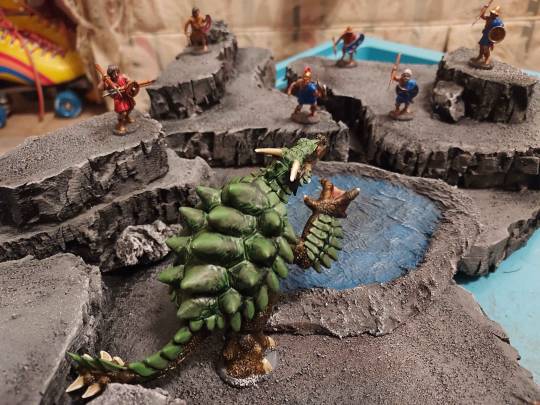

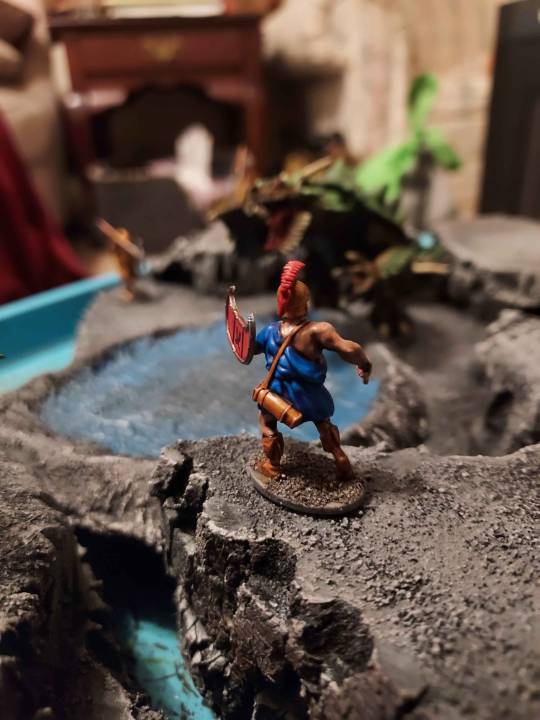
A diorama I put together for the local game store's year long painting contest. This is my final entry and I'm stoked at how well it came out. All of this stuff I've painted/made in the last month. I'm very proud of myself for this one.
20 notes
·
View notes
Text

Bylazstibian Empire - Soldier, Imperial Peltast
#art#illustration#design#digital art#drawing#drawdrawdraw#character design#sword#dnd#rpg#peltast#spear#javelin#fantasy#fantasy art#historical#history#knight#dark fantasy#low fantasy#artwork#artist on tumblr#armor#shield
15 notes
·
View notes
Photo

L'Armée d'Alexandre le Grand
Aucun commandant militaire dans l'histoire n'a jamais gagné une bataille à lui tout seul. Pour réussir, il avait besoin du soutien d'une armée bien entraînée qui le suivrait coûte que coûte dans les victoires éclatantes aussi bien que dans les défaites sans appel. Il suffit de lire l'histoire de Léonidas, qui mena courageusement ses 300 Spartiates vers une défaite inévitable aux Thermopyles. L'histoire a connu son lot de dirigeants compétents - Jules César, Hannibal et, plus tard, Napoléon. Cependant, ces trois hommes doivent rendre hommage à un seul individu et à son armée. Alexandre le Grand conquit la majeure partie du monde connu à son époque. De son père, le roi Philippe de Macédoine, il hérita d'une armée polyvalente et bien entraînée comme il n'en avait jamais existé. Unis dans un seul but, ils se battaient comme un seul homme. Alexandre en était conscient et aurait dit : "Souvenez-vous que de la conduite de chacun dépend le sort de tous."
Lire la suite...
7 notes
·
View notes
Text
#ClassicsTober24 Day 17. Iphikrates
Picked by Dr Roel Konijnendijk, Historian


0 notes
Photo

El ejército de Alejandro Magno
Ningún comandante militar de la historia ha ganado una batalla por sí solo. Para tener éxito necesita el apoyo de un ejército bien entrenado que lo siga cueste lo que cueste, ya sea una victoria impresionante o una derrota desesperada. Basta con leer la historia de Leónidas, que condujo con valentía a sus 300 espartanos hasta la inevitable derrota en las Termópilas. La historia ha tenido su cuota de líderes hábiles: Julio César, Aníbal y, más tarde, Napoleón. Sin embargo, estos tres hombres deben rendir homenaje a un solo individuo y a su ejército. Alejandro Magno conquistó la mayor parte del mundo conocido de su época. De su padre, el rey Filipo de Macedonia, heredó un ejército versátil y bien entrenado como nunca antes había existido. Unidos en un único propósito, luchaban como uno solo. Alejandro lo reconoció y se lo cita diciendo: "Recordad que de la conducta de cada uno depende el destino de todos".
Lire la suite...
0 notes
Text
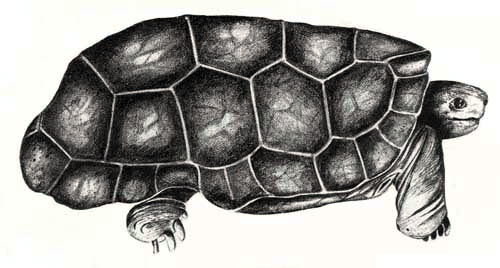
"Ci sono talmente tante testuggini di terra su questa isola, che a volte se ne vedono dei branchi di 2-3000 individui; così si possono fare più di cento passi camminando sulle loro schiene e senza mai toccare a terra con i piedi. Si radunano di sera in luoghi abbastanza oscuri e stanno così vicine che uno potrebbe credere che il posto sia pavimentato con i loro gusci"
—François Leguat, riguardo le testuggini giganti di Rodrigues (dal dorso a sella e a cupola), Voyage et avantures de François Leguat, 1708.
Dopo la pubblicazione delle sue memorie, l'isola di Rodriguez iniziò ad essere considerata una riserva di carne per le flotte francesi e inglesi. Le ultime due testuggini giganti di Rodrigues di quel luogo furono avvistate nel 1795 in fondo ad un burrone. Entrambe le specie sono ufficialmente considerate estinte dal 1800.
#testuggini di Rodrigues#estinzione#antropocene#Cylindraspis vosmaeri#Cylindraspis peltastes#sesta estinzione#estinzione di massa
12 notes
·
View notes
Photo
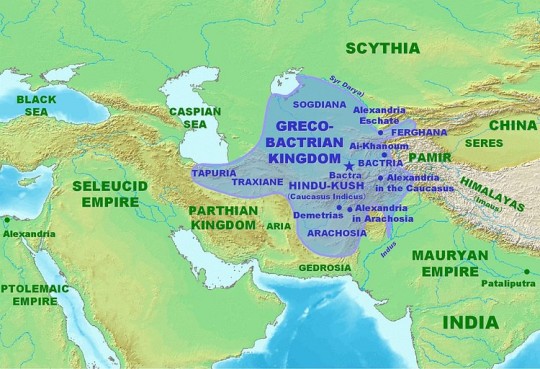
Greco-Bactrian and Indo-Greek Kingdoms in Ancient Texts
The rarity of the appearance of Greco-Bactrian and Indo-Greek kingdoms in ancient literature is one of the reasons why those states are so little-known today. Indo-Greek literature did exist, but none has been found that speaks about the Greco-Bactrian and Indo-Greek states. Classical authors tell us very little about Indo-Greek kingdoms, as they were far away from the Mediterranean world, cut off from other Greeks by the mighty Parthian state. Indian classical literature almost never interested itself in events, except from a religious point of view, and thus does not help to solve the dilemma. Chinese accounts exist, but only supply us with limited information.
Almost all of what remains today of ancient litterature about those kingdoms can be summarized on one page, which is what this article is going to accomplish.
NB: These are only quotes about the Greco-Bactrian and Indo-Greek kingdoms, and not about Bactria the area.
Greek Sources
When the news came that Euthydemus with his army was before Tapuria, and that ten thousand cavalry were in his front guarding the ford of the river Arius, Antiochus decided to abandon the siege and deal with the situation. The river being at a distance of three days' march, he marched at a moderate pace for two days, but on the third day he order the rest of his army to break up their camp at daylight while he himself with his cavalry, his light-armed infantry, and ten thousand peltasts advanced during the night marching quickly. For he had heard that the enemy's horse kept guard during the day on the river bank, but retired at night to a town as much as twenty stades away. Having completed the remainder of the distance during the night, as the plain is easy to ride over, he succeeded in getting the greater part of his forces across the river by daylight. The Bactrian cavalry, when their scouts had reported this, came up to attack and engaged the enemy while still on the march. The king, seeing that it was necessary to stand the first charge of the enemy, called on one thousand of his cavalry who were accustomed to fight round him and ordered the rest to form up on the spot in squadrons and troops and all place themselves in their usual order, while he himself with the force I spoke of met and engaged the p225Bactrians who were the first to charge. In this affair it seems that Antiochus himself fought more brilliantly than any of those with him. There were severe losses on both sides, but the king's cavalry repulsed the first Bactrian regiment. When, however, the second and third came up they were in difficulties and had the worst of it. It was now that Panaetolus ordered his men to advance, and joining the king and those who were fighting round him, compelled those Bactrians who were pursuing in disorder to turn rein and take to headlong flight. The Bactrians, now hard pressed by Panaetlus, never stopped until they joined Euthydemus after losing most of their men. The royal cavalry, after killing many of the enemy and making many prisoners, withdrew, and at first encamped on the spot near the river. n this battle Antiochus's horse was transfixed and killed, and he himself received a wound in the mouth and lost several of his teeth, having in general gained a greater reputation for courage on this occasion than on any other. After the battle Euthydemus was terror-stricken and retired with his army to a city in Bactria called Zariaspa.
(Polybius, Histories, X, 49, between 167-157 BCE. Translation: H. J. Edwards 1922)
For Euthydemus himself was a native of Magnesia, and he now, in defending himself to Teleas, said that Antiochus was not justified in attempting to deprive him of his kingdom, as he himself had never revolted against the king, but after others had revolted he had possessed himself of the throne of Bactria by destroying their descendants. After speaking at some length in the same sense he begged Teleas to mediate between them in a friendly manner and bring about a reconciliation, entreating Antiochus not to grudge him the name and state of king, as if he did not yield to this request, neither of them would be safe; for considerable hordes of Nomads were approaching, and this was not only a grave danger to both of them, but if they consented to admit them, the country would certainly relapse into barbarism. After speaking thus he dispatched Teleas to Antiochus. The king, who had long been on the look-out for a solution of the question when he received Teleas' report, gladly consented to an accommodation owing to the reasons above stated. Teleas went backwards and forwards more than once to both kings, and finally Euthydemus sent off his son Demetrius to ratify the agreement. Antiochus, on receiving the young man and judging him from his appearance, conversation, and dignity of bearing to be worthy of royal rank, in the first place promised to give him one of his daughters in marriage and next gave permission to his father to style himself king. After making a written treaty concerning other points and entering into a sworn alliance, Antiochus took his departure, serving out generous ratons of corn to his troops and adding to his own the elephants belonging to Euthydemus.
(Polybius, Histories, XI, 34.1-10, between 167-157 BCE. Translation: H. J. Edwards 1922)
The Greeks who caused Bactria to revolt grew so powerful on account of the fertility of the country that they became masters, not only of Ariana, but also of India, as Apollodorus of Artemita says: and more tribes were subdued by them than by Alexander—by Menander in particular (at least if he actually crossed the Hypanis towards the east and advanced as far as the Imaüs), for some were subdued by him personally and others by Demetrius, the son of Euthydemus the king of the Bactrians; and they took possession, not only of Patalena, but also, on the rest of the coast, of what is called the kingdom of Saraostus and Sigerdis. In short, Apollodorus says that Bactriana is the ornament of Ariana as a whole; and, more than that, they extended their empire even as far as the Seres and the Phryni. Their cities were Bactra (also called Zariaspa, through which flows a river bearing the same name and emptying into the Oxus), and Darapsa, and several others. Among these was Eucratidia, which was named after its ruler. The Greeks took possession of it and divided it into satrapies, of which the satrapy Turiva and that of Aspionus were taken away from Eucratides by the Parthians. And they also held Sogdiana, situated above Bactriana towards the east between the Oxus River, which forms the boundary between the Bactrians and the Sogdians, and the Iaxartes River. And the Iaxartes forms also the boundary between the Sogdians and the nomads.
(Strabo, Geography, XI. 11.1-2, between15/10 BCE and 24 CE. Translation: Horace Leonard Jones 1917)
At any rate, Apollodorus, who wrote The Parthica, when he mentions the Greeks who caused Bactriana to revolt from the Syrian kings who succeeded Seleucus Nicator, says that when those kings had grown in power they also attacked India, but he reveals nothing further than what was already known, and even contradicts what was known, saying that those kings subdued more of India than the Macedonians; that Eucratidas, at any rate, held a thousand cities as his subjects.
(Strabo, Geography, XV.3,between15/10 BCE and 24 CE. Translation: Horace Leonard Jones 1917)
Continue reading...
38 notes
·
View notes
Note
Hello dears ! I am asking you to support my campaign to help me to reach my goal. I am now in bad need to your support to help me stay alive and safe. Gaza is a very dangerous place either on the level of livelihood or on the level of souls. I need your monetary support to ensble me to get the basic needs for my family till Rafah crossing point reopens to move my family to safety and peace.Pleasd help a family be alive through your small donations or througn your shares to others.Thank you so much for your stand beside people in need .
Hello. I am a powerful hegemon in the Ionian colonies and will be sending a considerable force of citizen levies to your aid, including:
-5,000 well-equipped hoplite infantry in full panoply
-800 citizen cavalry armed with lance and sword, on swift and sure-footed Thessalian mounts
-500 peltast from among the lower classes
We will discuss payment after your safe crossing through Tyre into Lydia
51 notes
·
View notes
Text

A ghoulish peltast of Pickman and Carter's legion from the battle against the Moon-Beasts at Jagged Rock and after.
Having familiarised herself with javelins, this adult female wields a gnawed-at femur as a spear thrower for improved range. The types used at the time were improvised; afterwards they were ornamented with filigree in dental gold and locks of dead bride's hair.
Note that she has urinated upon the ground to make it soft enough to stand spare missiles in, to identify herself to other ghouls by scent, and to clog the tips up with noxious filth.
A weapon used sparingly at the time used a mummified arm to assist in the hurling of urn bombs - a weapon that spreads thick clouds of toxic, choking gas derived from extremely vile substances harmless to ghouls. This would, in time, gain prominence as a crucial means of screening the advance of ghoulish war and raiding parties.
#my art#cthulhu mythos#h p lovecraft#lovecraft#dream quest of unknown kadath#cthulhu#dreamlands#fantasy#ghouls
20 notes
·
View notes
Text
Victrix Greek Peltasts done!!!! Love how these guys turned out. First Victrix models I've painted and I'm loving them. Though the mold lines were pretty intense.
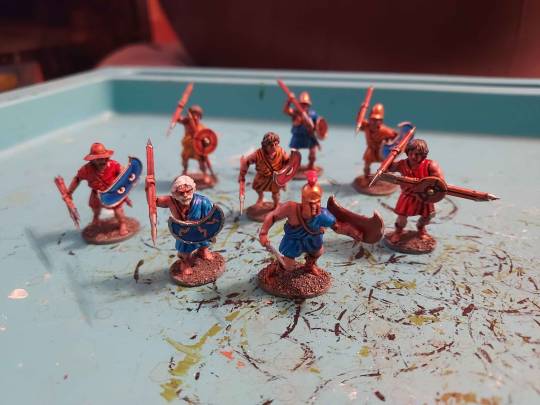
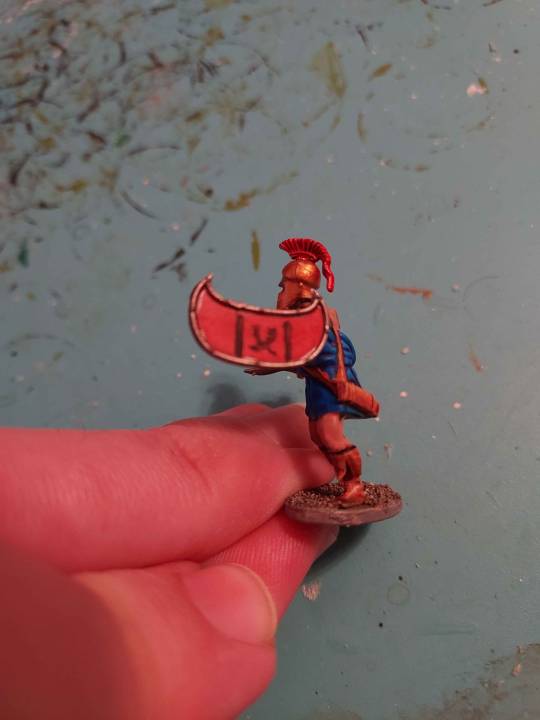
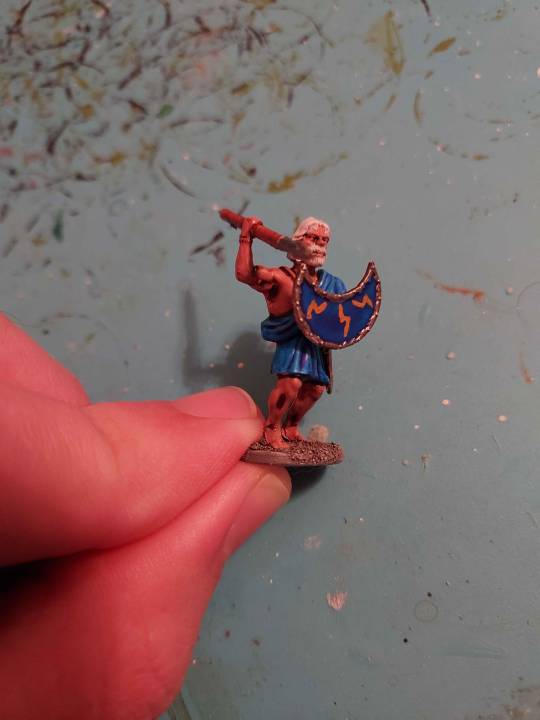
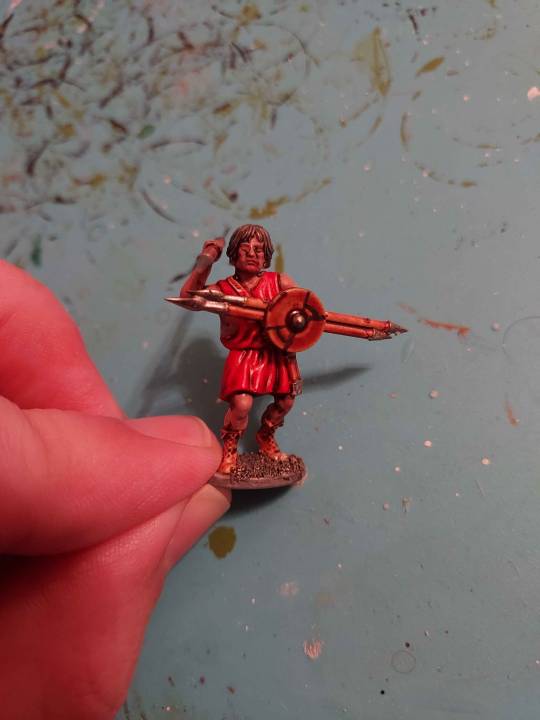

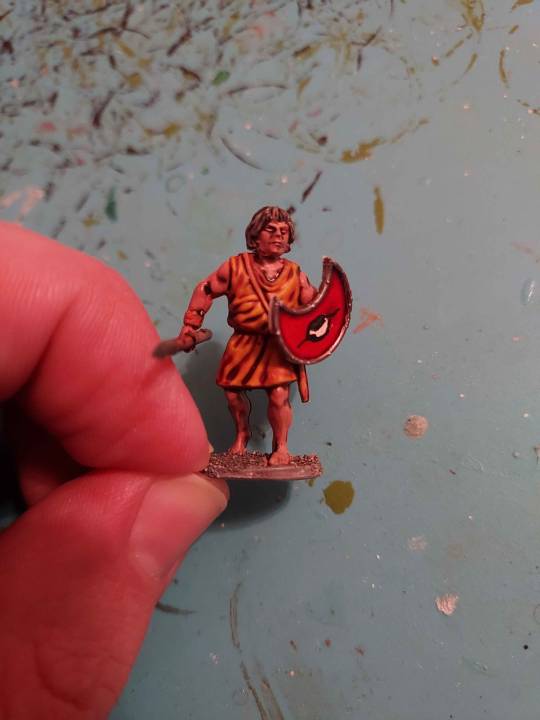
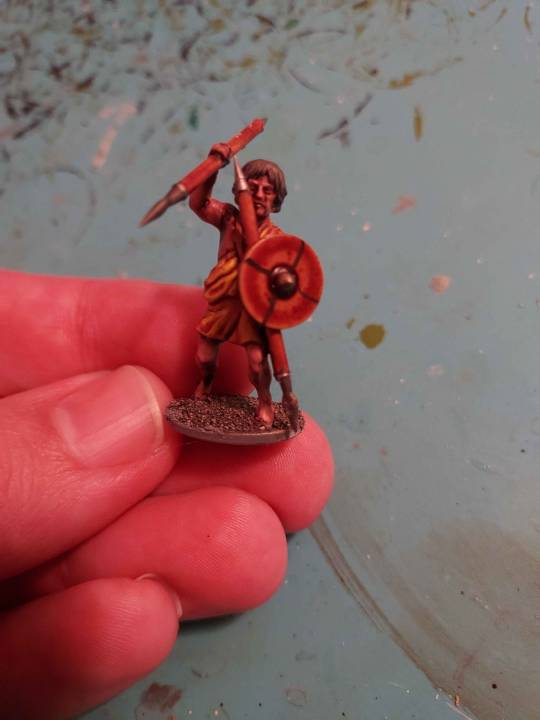
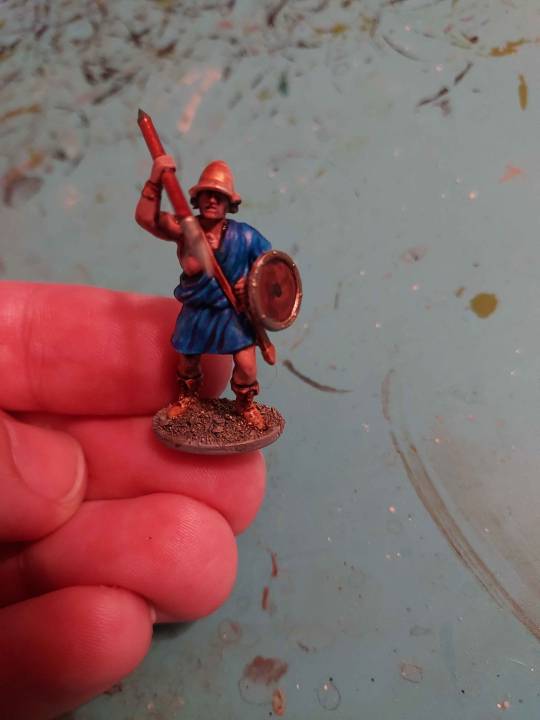
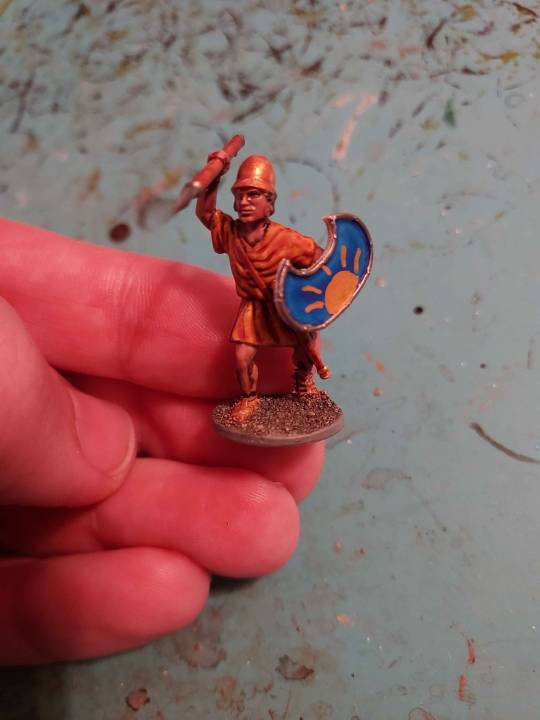
These guys are going to be elements of a diorama and THEN. They will be part of my eventual Thracian army for Dragon/Lion Rampant.
8 notes
·
View notes
Note
Even if secutarii don't get points I'm still gonna run peltasts as rangers bc their guns are fresh as hell
I can't fault you
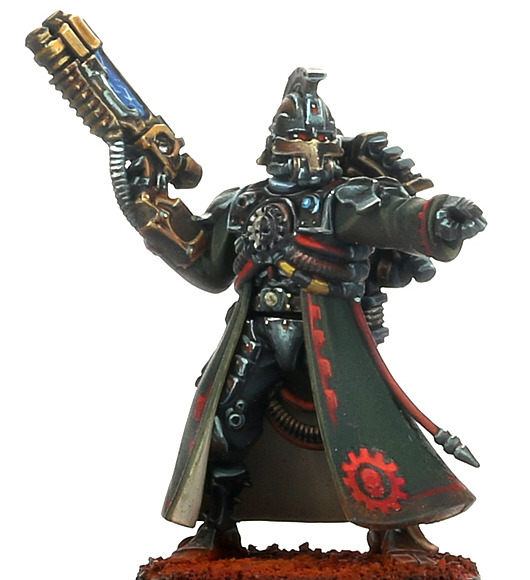
Those guns are rad as hell.
I may be a galvanic rifle guy personally, but even I melt over the Secutarii's loadouts.
Oough, they just scream Fallout 1/2 10mm pistol, and if ever there was a pinical of fictional gun design...


They were certainly treading close to perfection...

#skitposting#ask-itarii#fallout 2#admech#fallout#adeptus mechanicus#warhammer 40k#warhammer#warhammer 40000#40k#secutarii
103 notes
·
View notes
Photo

Bataille de Gaugamèles, 331 avant J.-C.
Une fois la côte méditerranéenne orientale et l'Égypte sécurisées, Alexandre le Grand décida de pénétrer en Mésopotamie avec l'intention de contraindre Darius à livrer bataille. Ayant traversé l'Euphrate sans rencontrer la moindre opposition, il fit marcher son armée vers l'est, le long des contreforts des montagnes arméniennes, avant de franchir le Tigre. Une fois le Tigre traversé, les éclaireurs macédoniens montés signalèrent qu'ils avaient aperçu des éléments de cavalerie perse à l'horizon. Ne souhaitant prendre aucun risque, Alexandre rangea son armée en ordre de bataille et, tandis que le gros de ses troupes avançait prudemment, il se mit personnellement à la tête d'un contingent de cavalerie et d'infanterie légère, attaqua les Perses, les mit en fuite et captura de nombreux prisonniers. Il apprit de ses captifs que Darius l'attendait à Gaugamèles, un petit village sis sur les rives de la Bumodus.
Lire la suite...
0 notes
Text
Workbench update!


Up first, some Gallic cavalry I’ve been working on to ally with the Carthaginians, the Romans, or the Greeks. (Really anyone… there were a lot of Gaelic people at that time in A LOT of places.
Im happy with their color scheme, being quite bright but not too vibrant (except maybe the yellow)
Up next are Greek Peltasts:

I love how quickly these guys paint up! I’ve elected to use various earth tones for their clothing on accounts of light infantry being of a (typically) poorer economic class at this time, and to my mind brown and grey will help hide you better in rocky terrain than bright blue.

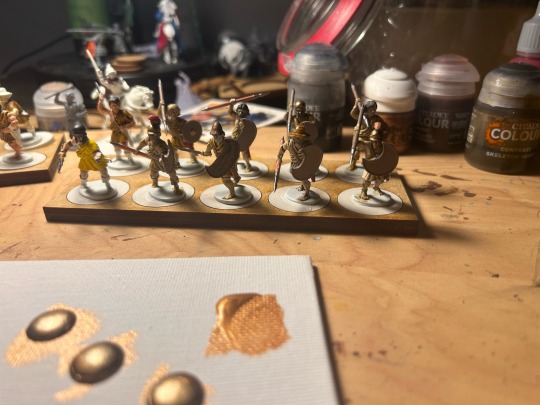
You can also spot some phalangite shields in working on. I’ve been sitting on em for a long time and it’s about time I finished them.
All these models I’ve been working on are from Warlord and Victrix. Overall like the warlord Macedonians better, but victrix just does plastic so well. I don’t think I’ll go back to warlord for anything other than Macedonians.
#mini painting#wargaming#warhammer#board games#wargames#warlord#victrix miniatures#current wip#history#alexander of macedon#carthage#miniatures#painting warhammer
15 notes
·
View notes
Text
Ares's design and other stuff
Okay, I now feel myself very stupid, because I thought that Ares's refusal of the sandals in his GOW1 design is some strange fictional decision.
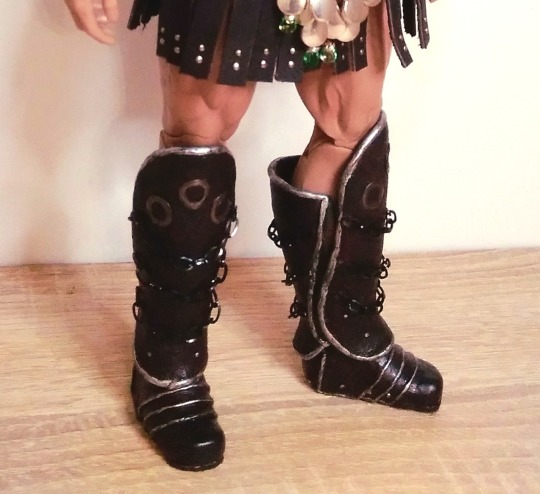
But seems like it is KINDA CANON??? In mythology Ares has Thracian origin (or at least he keeps favoritism towards this area of the Hellada). Thracia was the most nothern part of the Hellenic Greece, has very cold climat (and a huge influence by the celtic tribes). What i am getting at... Thracian peltasts commonly weared enclosed mid-calf fawn-skin boots named embades.
Ares is not strange, he just absorbs military culture.
(By the way, unlike the other civilized polises, Thracians considered tattooes as a sign of nobility. I wonder if Ares has one... if he has not, he probably absolutely loved Kratos's huge tattoo.)
(Oh, maaaaaybe he has no any tattoos, but that's the reason why he has some "body art" on his armor!).
(I think his mom Hera is just against of it lol)
(Ares is mama's boi, he won't tattoo himself against her wish even if he want to.)
(BTW-2, first Aphrodite's concept art from GOW3 shows that she has AN OMEGA TATTOO RIGHT ON HER FOREHEAD, which was enough to pisses Hera off for all eternity in sum with Ares's and Aphrodite's romance)
#god of war#gow#kratos#ares#ares god of war#upn the sky handycraft#kratos gow#aphrodite#Hera#Hera gow#Aphrodite gow#god of war 3
17 notes
·
View notes
Text
Useless fool
Art by Kloh.eh of Philippos and All The Things That Haunt Him lol. It's not only the fratricide - knowing your new stepfather probably wants to kill you is one of them, being the "dumb son" of the family is another.
Below the cut is a piece of my story, The teeth of the lamb. It's one I love because as a teacher who has seen plenty of students with damaged self esteem, I really want to give the poor boy a hug.

For context: Philippos, prince of Makedonia, has been sent as an hostage to the city of Thebes by his stepfather Ptolemaios of Aloros. After a week, he is invited to the house of the great general Epaminondas.
“Come here,” Epaminondas called, gesturing for me to insert myself at the best spot, between himself and Pelopidas.
I liked that I was close to my friend; not so that Epaminondas stood at my side. He cut an impressive figure and if Pelopidas was the sun, bright and warm, Epaminondas was the moon, colder and harder to read.
Pelopidas started to empty the boxes of their soldiers. They were crudely made, but well enough that I could see some were heavy infantry and some lighter troops, such as slingers. The man took the small soldiers and arranged them in two fat lines facing each other, while Epaminondas selected one figure for each type.
“Do you know what that is?” he asked, showing me a small man with a helmet that fully covered his head, a large shield, a cuirass, and spear and what looked like cnemides.
Of course I knew, I knew that, it was – it was…
“Do you know,” my stepfather’s voice echoed, “why Thebai can impose demands upon us?”
He was eating. The room (my father’s room, that had been my brother’s Alexandros the last time I had been there) smelled of lamb cooked in herbs. He chewed as he spoke and played with his food with his knife.
“Tell me,” he insisted, “how did Thebai grow powerful?”
I couldn’t look away from the knife. It was small, much smaller than the sword that had slashed Alexandros, but it cut easily enough into the flesh of the lamb. I could almost feel it grazing my skin as Ptolemaios of Aloros had his lamb. It disgusted me. I was not a follower of Orpheus, the weird men who ate no meat, but I knew the stories, the stories of cursed families such as ours: brothers killing brothers, fathers raping daughters, children cooked by jealous relatives.
A lamb, just a lamb. Ptolemaios waved the knife.
“What is the matter with you, Philippos? Did the Illyroi hit you on the head while you were herding goats with them? Or were you always that dumb?”
I did not remember. Maybe I had known, one day. I used to study with Perdikkas before I was sent to Illyria. Perhaps I was dumb, I thought. Our mother had learnt to read with Perdikkas and I, and Perdikkas had been much faster; he could even read silently, without mouthing the words. My teachers had always liked him better: bright, fast, bookish Perdikkas, the heir to the king. They hadn’t slowed down for me.
The answer did not matter anyway. Even if I had known how Thebai achieved hegemony over Hellas, no word would have gone through the terror clotting my throat.
“Unbelievable,” Ptolemaios spat. “Well, they can have you if they want, useless as you are!”
He had laughed a mean and somewhat relieved laugh, and I had fled by to my own room.
And that night, I was in Thebai, and I was asked a simple question I knew the answer to. But Epaminondas’ clear eyes were on me, searching my face for hints of the Gods knew what, and all I knew slipped away from my tongue. I shuffled on my feet. People were staring at me. Finally, painfully, I managed to respond, sounding very unsure, though it was common knowledge, even in Makedonia.
“Hoplite?”
Epaminondas nodded. Incredible relief washed over me, and then was snuffed out when he took another clay figure. Light infantry, with a shield shaped as an 8.
“Peltast.”
Another one, carrying a bow.
“Toxotai.”
“Good.”
He went through all the figures. I could name all of them, but once he was done, I felt like he had drained me of all my blood. The others had finished arranging their mock battlefield.
“Do you recognize this battle?” Epaminondas asked. “Take your time. See how the troops are laid out. And you,” he said, pointing at Lysias and Philolaus, “hush.”
They stared at me intently, their boys’ eyes soft and pretty as cows’. I knew the farce was up. Every brainless child could tell light from heavy infantry – I had seen my father’s and my brother’s troops marching for the crowd during the festivals of Xandika and like every boy, I had pointed at each unit, shouting their name in delight. Now, they would all see how ignorant I was. I could hear Ptolemy’s laugh at the back of my head. Useless fool.
I had to say something. The silence was smothering me; a man started to whisper to the one at his left. Was he mocking me? My throat felt tight again. Think think think. What would Perdikkas say? Surely, someone taught him about Thebai, with him being the heir, surely, some tidbits of those lessons must have gone into my thick head.
I felt trapped. I scrapped all the corners of my brain. It felt empty and clogged by wet cloth. I think I would have failed to answer with my own name, if someone had asked me.
“I don’t know,” I admitted. Barely a whisper. Dumb, barbarous boy. Pammenes had brought me here to weight against the fight at the palestra. Brave lad, bright lad, he had hoped. But Ptolemaios was right, just as Perdikkas had been right when we were younger: I was never smart, and now I had degenerated into a brainless idiot.
3 notes
·
View notes
Text
Campfire
The following excerpt from The First Empress: Book I is from one of my therapist's favorite scenes. He particularly liked the description of Lochagos Vola in the campfire light. Vola is Queen Viarra's Lochagos Hippeis (Master of Horse) in the hegemonic army. Nora is a young farm girl who volunteers for the army as a peltast (javelin skirmisher) in the wake of the deaths of her father, brothers, and fiance at the hands of barbarian raiders.
************
“[Queen Viarra] sounds too good to be true,” Nora admitted, cutting another hunk of mutton.
“Maybe I can introduce you some time,” Vola offered. “You’re cute enough, who knows, maybe she’ll make you part of her harem.”
“She has—” Nora paused to swallow a bite, “she has a harem?”
Vola cackled at her surprise. “Not that I know of, but she only takes women as bedfellows, so I’d be surprised if she doesn’t end up with a following of willing women to screw senseless every night. From what I’ve heard, she’s pretty spectacular at it.”
“So you’re not one of those women?” Nora asked, kind of aroused at the thought of bumping cunnies with a giant warrior queen.
“Nah, Viarra’s practically a daughter to me,” Vola laughed again. “She even came to me for advice the first time she and her handmaid Elissa decided to fuck. It must’ve worked out, since Elissa’s the royal concubine now.”
“I know I’ve been attracted to women in the past, but I’ve never actually been with one,” Nora admitted before finishing the last couple bites of dinner.
“I can show ya what it’s like if ya want, sweet-tits,” Vola offered, setting her knife and plate aside as she finished eating.
Nora raised her brows at the proposition, looking over at Vola. The firelight danced off Vola’s tattoos, wiry muscles, and weathered brown skin, somehow making her look perversely alluring against the surrounding darkness. Leathery, mostly grey-haired, and easily old enough to be Nora’s grandmother, the lochagos wasn’t a beautiful woman—or really even a handsome one. But Nora had to admit there was an animalistic charisma about her. Something told Nora that despite Vola’s fearsomeness and savagery, she had a deep understanding of sexuality and intimacy.
“I’ll… think about it,” Nora murmured, chewing her lower lip.
12 notes
·
View notes